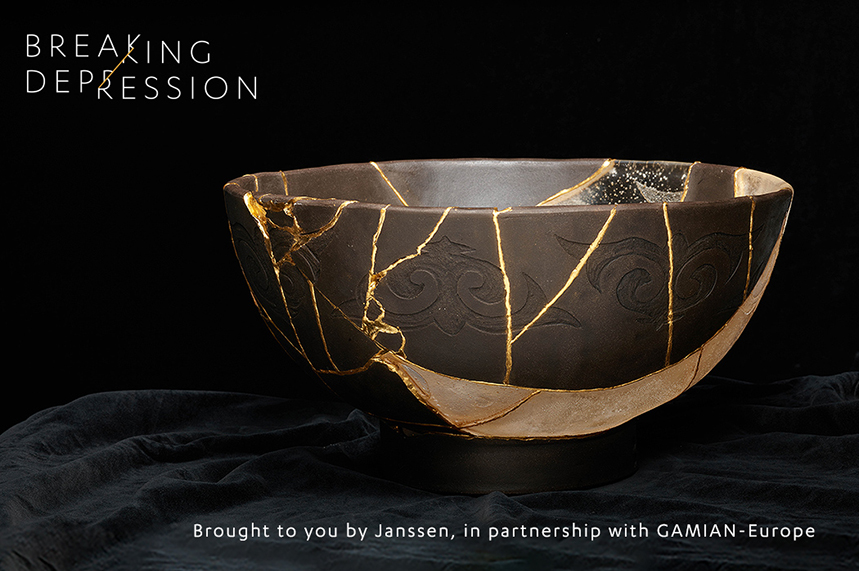Janssen, a subsidiary of Johnson & Johnson, will be making a renewed call on people to “start one conversation today about depression.”
Aimed at the general public and healthcare professionals, the campaign was launched on World Mental Health Day last year.
Striking image
Publicis Health helped launch the campaign, created by Janssen and supported by the Global Alliance of Mental Illness Advocacy Networks Europe. Campaign imagery was centred on a powerful metaphor of broken objects that had been made whole again.
Eight artworks were created using the Japanese art of kintsugi – which involves repairing broken objects with gold lacquer – based on eight case studies of people suffering from major depressive disorder.
Advertising and the use of Janssen’s social-media channels amplified the campaign content.
New agency offering
This weekend’s launch of the next phase in the campaign is being handled by Langland, a new division of Publicis Health working on clinical trials, medical strategy and education, public relations, policy and advertising.
It brings together four different agencies – Langland, Publicis Life Brands, Publicis Resolute and Real Science – under the Langland brand.
The new offering is a breath of fresh air, according to Cristiana Maria, therapeutic area comms and public affairs senior manager, EMEA, Janssen. “It’s absolutely amazing to be able to tap into the talent all at once,” she said.
Maria told PRWeek that the approach is a “model worth considering” by other agencies. “But I think what’s special with Langland is also the dynamics between their people and their team.”
She paid tribute to the agency, which she regards as part of her “team”, and said she wanted the campaign to “move the needle on conversations around depression”.
Making an impact
Maria did not want to raise awareness for its own sake, but to prompt “meaningful conversations” about depression.
The comms chief cited personal examples of the campaign’s effectiveness. During an event in Copenhagen last year she was approached by two psychiatrists who, she said, “had tears in their eyes” and thanked her. “They could clearly see that I was a bit puzzled and one of them said: ‘When I started [in] this profession 20 years ago it was about the person; [in the] meantime it became about the products and the process, so thank you for refocusing again on the person.’”
She has also met people for whom the metaphor used in the campaign “really resonated with them and they found it as a respectful yet accurate way of depicting what they are going through, so that was very precious to me”.
To date, 34 million people have been reached through social media and the campaign website. About 41,000 people have pledged their support to the campaign via the website and Instagram. There have been more than 640,000 views of a ‘making of’ campaign video and more than 1,300 conversations have been started based on posts using #BreakingDepression.
The campaign’s impact is not just the number of views and people reached, but “meaningful” metrics such as the actions people have taken, according to Jake Davis, business unit director, PR & Policy, at Langland.
“From my perspective, the success of this campaign is the conversations that it started. You can have a breathtaking piece of creative work that looks lovely, but if that is all it does that actually would mean we had failed somehow,” he said.
Maria commented: “Our call to action for this year, and indeed we want to make it more poignant around World Mental Health Day, is: ‘Start one conversation today about depression.’
“By talking about depression we go back to our initial objective of the campaign, which is breaking the silence, breaking the stigma, and actually empowering people to go and seek the right support.”







